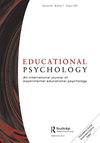反馈和年级水平对大学生自我评估中自我效能感和情绪的影响:量规与教师反馈的积极影响
IF 3
2区 心理学
Q1 EDUCATION & EDUCATIONAL RESEARCH
引用次数: 0
摘要
摘要本研究探讨了大学生自我评价时反馈场合、反馈类型和年级对自我效能感和情绪的影响。来自三个不同年级的126名高等教育学生分别在收到反馈之前和之后对他们的写作任务进行了两次自我评估。自我效能感和情绪通过自我报告三次测量(自我评估前基线、自我评估后无反馈、自我评估后有反馈)。反馈是在三种情况下提供的(分组、教师反馈、组合),参与者是随机分配的。总体而言,标题反馈对自我效能感和情绪的影响最大(即积极情绪增加,消极情绪减少)。年级水平对自我效能感的影响显著,表明大学教育经历的影响增强了这一变量。本研究表明,反馈对自我评估时的自我效能感和情绪产生了影响,其中对标题反馈的影响尤其积极。本文章由计算机程序翻译,如有差异,请以英文原文为准。
Feedback and year level effects on university students’ self-efficacy and emotions during self-assessment: positive impact of rubrics vs. instructor feedback
Abstract This study explored the effects of three factors (feedback occasion, type of feedback, and year level) on self-efficacy and emotions when university students self-assessed. 126 higher education students from three different year levels self-assessed their performance on a writing task two times (before and after receiving feedback). Self-efficacy and emotions were measured via self-report at three times (a baseline before self-assessment, after self-assessment without feedback, and after self-assessment with feedback). Feedback was provided in one of three conditions (rubric vs. instructor’s feedback vs. combined) to which the participants were randomly assigned. In general, rubric feedback showed the strongest effects on self-efficacy and emotions (i.e. increased positive and decreased negative emotions). Year level was significant for self-efficacy, showing that the effect of university schooling experience enhances this variable. This study shows the impact that feedback has on self-efficacy and emotions while self-assessing, with an especially positive effect for rubric feedback.
求助全文
通过发布文献求助,成功后即可免费获取论文全文。
去求助
来源期刊

Educational Psychology
Multiple-
CiteScore
6.40
自引率
6.20%
发文量
57
期刊介绍:
This journal provides an international forum for the discussion and rapid dissemination of research findings in psychology relevant to education. The journal places particular emphasis on the publishing of papers reporting applied research based on experimental and behavioural studies. Reviews of relevant areas of literature also appear from time to time. The aim of the journal is to be a primary source for articles dealing with the psychological aspects of education ranging from pre-school to tertiary provision and the education of children with special needs. The prompt publication of high-quality articles is the journal"s first priority. All contributions are submitted "blind" to at least two independent referees before acceptance for publication.
 求助内容:
求助内容: 应助结果提醒方式:
应助结果提醒方式:


